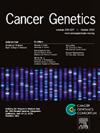循环游离DNA的泛癌甲基化分析
IF 2.1
4区 医学
Q4 GENETICS & HEREDITY
引用次数: 0
摘要
基于循环无细胞DNA (cfDNA)甲基化分析的通用癌症筛查能够实现多器官癌症检测,从而降低全因死亡率,防止基于指南的癌症特异性筛查误诊癌症。本研究旨在建立基于血液的多种癌症早期检测的基因甲基化面板。材料和方法对多种人类癌细胞系和健康人血液进行生物信息学分析和内部DNA测序,以确定候选泛癌甲基化位点。然后使用甲基化敏感限制性内切酶定量PCR (MSRE-qPCR)进行DNA甲基化分析。从103例不同类型癌症患者和40名健康受试者中提取血液cfDNA进行甲基化分析。结果通过生物信息学分析和内部DNA测序,我们确定了两个候选泛癌甲基化位点,HIST1H4F和CDO1。在各种癌细胞系中,在HIST1H4F和CDO1的启动子上发现了一长段甲基化,而在健康人中,这些基因组区域未甲基化。经临床样本检测,我们的基因甲基化面板检测泛癌的灵敏度和特异性分别为47.57%和90.00 %。按癌症亚型分析,肺癌的检测灵敏度最高(76.92%),其次是结直肠癌(63.64%)和胃癌(50.00%)。结论我们新建立的基因甲基化面板为多种肿瘤筛查提供了一种新的检测方法。由于不需要亚硫酸氢盐转化和侵入性手术,可以加速癌症诊断,简化泛癌症筛查的操作。本文章由计算机程序翻译,如有差异,请以英文原文为准。

Pan-cancer methylation analysis of circulating cell-free DNA
Background
Universal cancer screening based on methylation analysis of circulating cell-free DNA (cfDNA) enables multi-organ cancer detection, thereby reducing all-cause mortality and preventing cancer misdiagnosed by guideline-based cancer-specific screening. This study aims to establish a gene methylation panel for blood-based multi-cancer early detection.
Materials and methods
Bioinformatics analysis and in-house DNA sequencing of various human cancer cell lines and blood from healthy persons were carried out to identify candidate pan-cancer methylation sites. Methylation-sensitive restriction enzymes-quantitative PCR (MSRE-qPCR) was then used for DNA methylation analysis. Blood cfDNA from 103 patients with diverse cancer types and 40 healthy subjects was extracted for methylation analysis.
Results
By bioinformatics analysis and in-house DNA sequencing, we identified two candidates pan-cancer methylation sites, HIST1H4F and CDO1. A long stretch of methylation was found on the promoters of HIST1H4F and CDO1 across various cancer cell lines, while these genomic regions are unmethylated in healthy persons. When tested with clinical samples, the detection sensitivity and specificity of our gene methylation panel in detecting pan-cancer were 47.57 % and 90.00 %, respectively. When analyzed by cancer subtypes, the detection sensitivity was the highest in lung cancer (76.92 %), followed by colorectal cancer (63.64 %) and gastric cancer (50.00 %).
Conclusions
Our newly established gene methylation panel provides an alternative assay for multi-cancer screening tests. As no bisulfite conversion and invasive procedures are required, it can accelerate cancer diagnosis and streamline the operation for pan-cancer screening.
求助全文
通过发布文献求助,成功后即可免费获取论文全文。
去求助
来源期刊

Cancer Genetics
ONCOLOGY-GENETICS & HEREDITY
CiteScore
3.20
自引率
5.30%
发文量
167
审稿时长
27 days
期刊介绍:
The aim of Cancer Genetics is to publish high quality scientific papers on the cellular, genetic and molecular aspects of cancer, including cancer predisposition and clinical diagnostic applications. Specific areas of interest include descriptions of new chromosomal, molecular or epigenetic alterations in benign and malignant diseases; novel laboratory approaches for identification and characterization of chromosomal rearrangements or genomic alterations in cancer cells; correlation of genetic changes with pathology and clinical presentation; and the molecular genetics of cancer predisposition. To reach a basic science and clinical multidisciplinary audience, we welcome original full-length articles, reviews, meeting summaries, brief reports, and letters to the editor.
 求助内容:
求助内容: 应助结果提醒方式:
应助结果提醒方式:


